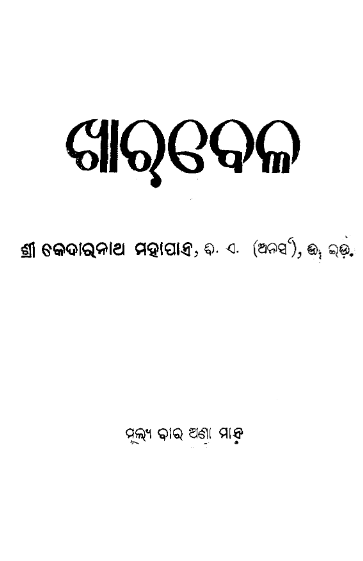Kharabela, a seminal biography by Kedara Natha Mahapatra, published in 1941, offers a compelling glimpse into the life of one of Odisha’s most revered historical figures, King Kharabela of Kalinga. This work stands out as a significant contribution to Odia literature and historiography, blending biographical narrative with rich cultural and historical context.
King Kharabela reigned during the 1st century BCE and is celebrated for his military prowess and administrative skills. The Kharavela inscription reveals that he played a crucial role in restoring the glory of Kalinga, a region that faced various challenges from rival kingdoms. Mahapatra’s work meticulously explores both the historical backdrop and the legacy of Kharabela, situated within the larger framework of India’s ancient political landscape.
Kedara Natha Mahapatra adopts a narrative style that combines meticulous research with a storytelling approach, making the biography not just informative but also engaging. The book is structured chronologically, tracing Kharabela’s journey from his early life, ascension to the throne, military campaigns, to his later contributions to the cultural and spiritual life of Kalinga.
Mahapatra’s writing is imbued with a sense of reverence and admiration for Kharabela. Through vivid descriptions and evocative language, he brings the king’s character to life, portraying him as a multifaceted leader, capable of both fierce warrior spirit and profound philosophical thought. This duality is crucial in understanding Kharabela’s impact on his kingdom and beyond.
One of the prominent themes in Kharabela is the valor and leadership qualities exhibited by the king. Mahapatra emphasizes the king’s military strategies, detailing various battles and victories that helped protect and expand Kalinga’s territory. However, the biography does not only focus on Kharabela’s martial achievements; it also highlights his dedication to governance and public welfare.
The author portrays Kharabela as a ruler who prioritized the well-being of his subjects, implementing policies that fostered prosperity and cultural development. His patronage of the arts, architecture, and religion are examined, illustrating how Kharabela’s reign marked a golden era for Kalinga.
Kharabela also delves into the cultural and spiritual dimensions of Kharabela’s legacy. Mahapatra discusses the king’s contributions to Buddhism, noting that Kharabela was instrumental in promoting the teachings of Buddha in Kalinga, reflecting a more profound spiritual commitment in addition to his political ambitions. This connection to Buddhism adds depth to Kharabela’s character, positioning him as a forward-thinking leader in a transformative era.
Books Info
| Books name | Kharabela / ଖାରବେଳ |
| Author | Kedara Natha Mahapatra |
| No Of pages | 137 |
| Publisher | Students Store |
| Publication | 1941 |
| Printed At | Satyabadi Press |
| Distributor | NA |

